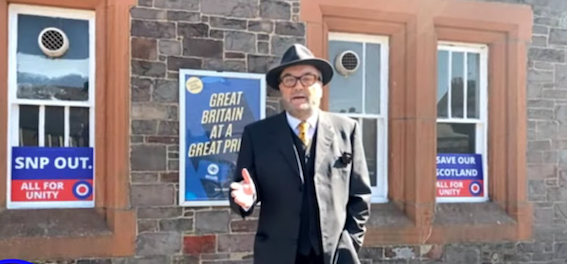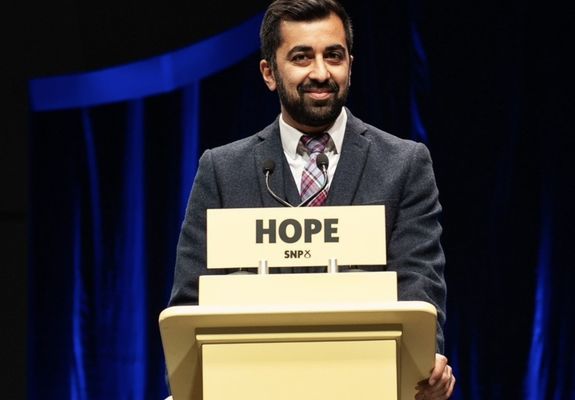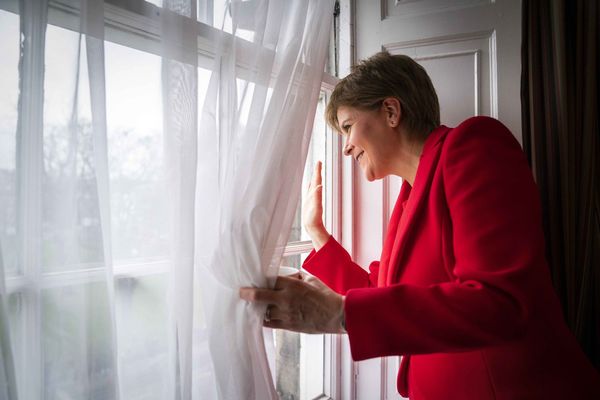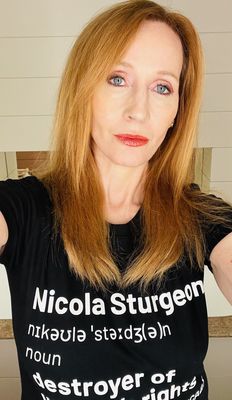GEORGE Galloway used to fight for Ireland’s unity, now it’s Britain’s. The socialist firebrand turned Kremlin TV personality is playing a fascinating cameo role in Scotland’s general election.
He is fronting the country’s staunchest unionist slate, an alliance of ultra-conservatives and British nationalists who, broadly, see mainstream pro-UK parties as just too milquetoast to stand up to the ruling pro-independence SNP.
A portrait of Winston Churchill behind his left shoulder, Mr Galloway last week made his big pitch for his new party, All for Unity.
Party Election Broadcast from George Galloway's All For Unity https://t.co/1g1kBTWxG0
— George Galloway (@georgegalloway) April 22, 2021
“Fourteen years of nationalist grudge and grievance has taken Scotland down a low road,” he said in a party political broadcast. "If we don't get off this hamster wheel, this 'neverendum,' we are not going to enjoy where this will end up.”
Mr Galloway had earlier suggested where Scotland’s constitutional crisis might indeed finish: in partition. He might like British and Irish unity, but he thinks the break-up of Scotland would be "unstoppable" after any referendum vote for independence. His party supports regional votes to allow parts of Scotland to stay in the UK.
Mr Galloway has been repeatedly grilled on his pro-Kremlin views and his regular broadcasts on Vladimir Putin’s main western mouthpiece, RT.
His party has been an interesting experiment, a test of just how popular political loyalism is in Scotland. The answer, so far: not very.
It looks like passionate pro-UK sentiment found on social media - the cliché being a certain but far from universal brand of Rangers supporter with strong views on the constitution - does not translate in to a meaningful vote at the ballot box.
A general election for Scotland’s Holyrood parliament takes place on May 6. Every pundit across the Sea of Moyle will tell you that what really matters is not who wins - we all know that it will be Nicola Sturgeon and her pro-independence SNP. No, what counts is by how much she wins, whether she can secure an overall majority or not, or whether she comes to rely on her sometimes allies, the Scottish Greens.
🏴 An independent Scotland can have all the powers needed to build a fairer society - like Denmark or Norway.
— The SNP (@theSNP) April 25, 2021
📺 Watch @NicolaSturgeon debunk the arguments that Scotland can't thrive with independence.
🗳️ To secure that choice, make it #BothVotesSNP on May 6. pic.twitter.com/KE7BknnfXM
We also know who will lose the election: unionist parties. But, again, what matters is not so much that they are losing, but which of them loses the least.
Mr Galloway’s All for Unity, polls suggest, will not make any significant breakthrough.
But what of the established mainstream pro-UK parties, the Scottish wings of the Britain-wide Labour, Conservatives and Liberal Democrats?
Right now Tories are the biggest opposition party. They have staged something of a recovery in Scotland since 2014, partially thanks to an ability to hoover up voters who do not want another independence referendum. Scottish Conservative literature and rhetoric rams home this message, saying a vote for the Tories is a vote to stop indyref2. This is not easy to square with an official London stance that UK Prime Minister Boris Johnson will veto another big plebiscite whatever happens on May 6.
The Scottish Conservatives are now led by a football linesman and MP called Douglas Ross, who mostly sticks closely to talking points about ‘no more divisive referendums”. But as the campaign develops, Mr Ross has been pushed on to the defensive about Tory sleaze allegations in England.
The latest polls suggest there might just be a battle for second place. Mr Ross’s personal ratings are far better than Mr Johnson’s but they are still well in to negative territory, -26 per cent, according to a survey published in last weekend’s Sunday Post newspaper. That compares with -42 per cent for the prime minister, +16 per cent for Ms Sturgeon and a spectacularly bad -62 per cent for Alex Salmond, a former First Minister who, like Mr Galloway, is trying to return to front line politics with a new party after a spell on RT.
The same Sunday Post poll suggests the new leader of Scottish Labour, Anas Sarwar, is the only other politician who joins Ms Sturgeon in positive territory. He is on +7 per cent.
Labour, the survey suggests, will collect 24 of Holyrood’s 129 seats, the same as it held in the last parliament but putting it ahead of Mr Ross’s Tories, which will slump to 22. The SNP? Well, Ms Sturgeon’s party would get 67, a clear majority, while the Greens collect 11 seats and the Liberals five, mostly thanks to their bulwark seats in the northern isles and Fife.
Other polls have been telling slightly different stories, with the SNP majority all to play for and the Tories holding Labour at bay.
When you’re on a campaign visit with @AnasSarwar and there’s a dance class going on.
— Gordon McKee (@GordonMcKee_) April 24, 2021
He couldn’t resist.... pic.twitter.com/WQmZmQdoag
But Mr Sarwar is upbeat. So much so that last week he joined an outdoor dance exercise class he stumbled upon during campaigning in West Lothian. He boogied to Uptown Funk by Mark Ronson and Bruno Mars.
The sun has been out in Scotland and lockdown measures are being relaxed. So Mr Sarwar’s moves - unscripted, unstaged, apparently - caught the mood a little. If Holyrood elections were settled by dance-offs, his party would sure be in with a shout to strut its stuff in power.
Labour is trying - not always convincingly, say its critics - to pitch an anti-nationalist message rather an alternative nationalist one.
So while the Tories offer a union jack instead of a saltire - though this characterisation would annoy them - Mr Sarwar’s lieutenants have been repeating the old anecdote of the late SDLP leader John Hume, that, as his father told him, “you can’t eat a flag”.
Delighted to join our excellent candidate for Clydebank and Milngavie, @Pam_Gosal to visit local retailers yesterday.
— Douglas Ross MP (@Douglas4Moray) April 22, 2021
Businesses have shown incredible resilience over the past year and its great to get out and see them starting to trade once again. pic.twitter.com/y5ckZDFrEA
Nevertheless, Labour, one Scotland’s biggest party, has been squeezed. Their opposition to a second referendum puts off some of their former voters in working-class central Scotland and is not staunch enough to appeal to diehard unionists.
Yet who comes second in next month’s election is almost as important as who wins. Because it could define which political force takes the lead in the campaigning against independence in a future referendum. And polls are suggesting Scotland is fairly evenly divided on the big constitutional question.
John Curtice, a politics professor of Strathclyde University in Glasgow, summed up this issue at the outset of the campaign. Right now, he explained, the Tories, in power in the UK and in opposition in Scotland, would lead any pro-UK campaign. But what if Labour comes second in May?
He added: “Fundamentally one of the reasons why they [unionists] don’t want a referendum is it is very, very difficult for the Unionist side to find somebody behind whom they might be willing to unite.”
So far the only thing polling suggests is that the figure least likely to unite Scotland’s pro-UK parties is Mr Galloway.








